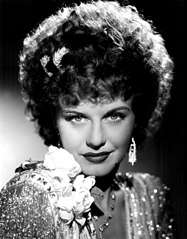Roxie Hart
Roxanne "Roxie" Hart is a fictional character. She is the main character of the 1926 play Chicago and its various remakes and derivatives.

Development
The playwright, reporter Maurine Dallas Watkins, was inspired by the trials, both of which ended in acquittals, of Beulah Annan and Belva Gaertner (for separate crimes), which she covered for the Chicago Tribune. Annan's story served as the basis for the play: she had killed her paramour Harry Kalstedt and was able to convince her auto mechanic husband Albert to pay for her successful defense, only to dump him the day after the trial. For the play, Annan was fictionalized as Roxie Hart, Kalstedt became Fred Casely, and Albert became Amos Hart. Some of the details of Gaertner's crime, including her past as a vaudeville singer (Annan was a bookkeeper) and blaming of her misdeed on getting drunk, were also applied to the Roxie character.[1] The 1975 musical adaptation bases Hart's mannerisms on Helen Morgan.[2]
Character background
During her time as a young adult, Roxanne dreamed of a career in vaudeville but, despite dating noted mobster Al Capelli and getting some press attention as a socialite, is never able to break into the business beyond some work as a chorus girl in a seedy nightclub on Chicago's South Side. Defeated, she falls for auto mechanic Amos Hart, a kind-hearted but meek and naïve man with a stable working-class income; his relationship with Roxie is more akin to that of a father figure (her own father disowned her three years before she met Amos) than a romantic partner. Seven years into the marriage, she and Amos have stopped having sex and she begins an affair with Fred Casely, a furniture salesman, while Amos is working his long hours. At the start of the show, Roxie shoots Fred after he attempts to break off the affair.
Unable to convince Amos to take the fall, Roxie is arrested for the crime and, while being detained, falls under the influence of the prison's bribe-taking warden, "Mama" Morton, who has the connections to turn Roxie's case into a media sensation and also connects her to hotshot lawyer Billy Flynn. Roxie uses the media coverage as a way for her to revive her aspirations of a vaudeville career, with Flynn and Morton helping along the way. Throughout her trial, she forms a rivalry with another murder suspect, Velma Kelly.
In the end, Roxie is acquitted of the crime, Amos leaves her (both for lack of attention and lying about being pregnant to gain sympathy from the press), and her dreams of superstardom are dashed when the media abandons her story. She eventually returns to the vaudeville circuit, now with Velma as a partner.
Roxie sings several songs in the musical. "Funny Honey" is a torch song and ode to her husband for his kindheartedness and willingness to take the blame for her crime, before he confesses he had nothing to do with it, at which point the song becomes a scathing insult toward him. She lip syncs "The Press Conference Rag" as a ventriloquist's dummy, with Billy Flynn as her master. In "Roxie," she maniacally imagines her future stardom as the result of her newfound fame. "My Own Best Friend," the first duet with Velma, closes out the opening act. "Me and My Baby" is an Eddie Cantor-like number in which she lauds her (nonexistent) future child. The final song before the finale, "Nowadays," is another duet with Velma, a bittersweet recollection of the state of Chicago at the time.
Portrayals
The play made it to Broadway in 1926 and ran for 172 performances. Gaertner attended the Chicago opening. Its adaptations include:
- Chicago, a 1927 silent film, with Phyllis Haver playing Roxie
- Roxie Hart, a 1942 film starring Ginger Rogers as Roxie. This adaptation is notable for her husband Amos being the real murderer, but Roxie going along with it as a boost to her career
- Chicago, the original 1975 Broadway stage musical, featuring Gwen Verdon,[3] and its 1996 revival, which starred Ann Reinking
- Chicago, an Oscar-winning 2002 film adapted from the 1975 musical (and its 1996 revival), starring Renée Zellweger as Roxie[3]
Performers who have portrayed Roxie Hart in the musical also include Katherine Edgar, Paige Davis, Erika Jayne, Liza Minnelli (who substituted for Gwen Verdon in the original production in 1975), Ann Reinking, Bianca Marroquin, Brooke Shields,[3] Ruthie Henshall, Melora Hardin,[4] Ashlee Simpson,[3] Melanie Griffith,[3] Samantha Harris, Michelle Williams,[3] Christie Brinkley and Brandy Norwood.[5] Henshall, Simpson, Shields, and Williams have portrayed the character both on Broadway and The West End. Bebe Neuwirth, who won a Tony Award for the role of Velma Kelly in 1997, also portrayed Roxie in the same production in 2006.[3]
References
- "The Women Who Inspired Roxie Hart and Velma Kelly". Clyde Fitch Report. Retrieved 2016-03-08.
- Kander, John; Ebb, Fred; Lawrence, Greg (October 2004). Colored Lights: Forty Years of Words and Music, Show Biz, Collaboration, and All That Jazz. Farrar, Straus and Giroux. pp. 128–129. ISBN 978-0-571-21169-2.
- "Hart to Hart: a lineup of Roxies in the musical Chicago". guardian.co.uk. London. July 15, 2009. Retrieved February 13, 2010.
- Office Star Hardin to Make Broadway Debut in Chicago Archived 2009-01-07 at the Wayback Machine
- "Good Luck To Ya, Brandy! Grammy Winner Brandy Norwood Will Rake in the Chips in Broadway's Chicago". broadway.com. March 24, 2015.